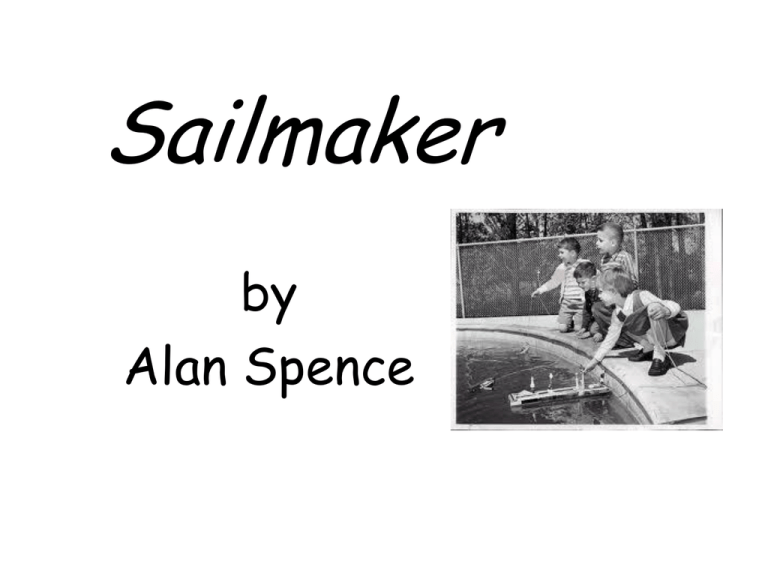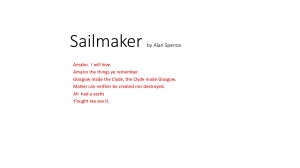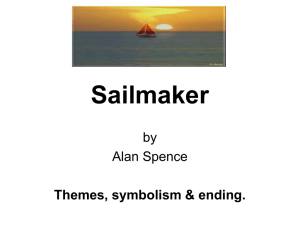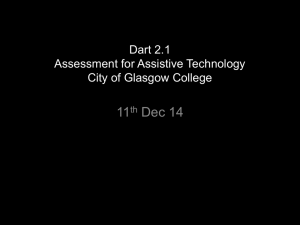Sailmaker – Intro
advertisement

Sailmaker
by
Alan Spence
Shipbuilding
in Scotland
• The River Clyde and the West of Scotland
began to develop as a major industrial centre
during the 19th century.
• Expertise in engineering, large local supplies of
coal and a growing workforce flooding in from
the countryside helped the growth of the
shipbuilding industry.
Shipbuilding in Scotland
Thousands of men
laboured in yards stretching
from Greenock into the
centre of Glasgow.
Shipbuilding in Scotland
• Ships from the Clyde were sold all over the
world and many of the great battleships
(dreadnaughts) that made up the main military
strength of the British Empire were also “Clyde
built”. This phrase came to be associated with
quality and strength.
• However, two world wars, economic slumps and
the availability of cheaper ships in Japan and
Korea started a process of gradual decline that
grew faster from the 1960s onwards.
• The shipyard workers felt as if they were being
thrown on the scrap heap as thousands of layoffs took place.
Glasgow Tenements
Tenement style housing
was the most numerous
in Glasgow in the 1950s
and 60s. Tenements
are rows of cheap
housing which were
often cramped, small
and very basic. They
were generally the
homes of the working
class.
Glasgow Belongs to Me 1963 part one
• https://www.youtube.com/watch?v=RmXd
OQI3Q_4&list=PL79803AF6424830D9&in
dex=41
Short colour film showing Glasgow in the early 1960’s contemporary with
Sailmaker – good footage of tenements and other relevant elements.
Youtube – Chris Lavelle
About the Author…
• Alan Spence was born in Glasgow in 1947, and his
childhood in that area was a significant inspiration for his
writing
•Alan Spence was born in Glasgow to
Glaswegian parents, Charlotte ('Nettie')
Spence and Alexander (Alex) Spence, who
was a sailmaker by trade, although he
latterly worked as a storeman. His mother
died when Spence was 11.
•He went to the University of Glasgow in 1966
and started a Law degree, then switched to
English and Philosophy, completing his
degree a few years.
Sailmaker is an autobiographical work and Spence
has described the writing of the play and earlier
short story Blue, as ‘cathartic’ – meaning that it
allowed him to re-visit difficult emotions mainly about
his mother’s death.
“There’s always things in your life that you’re
dealing with for your whole life, in my case
very obviously my mother dying when I was
so young…it was a huge traumatic
experience for me. I think something like that
sets you questioning the whole meaning of
existence. The reality of having someone as
close as your mother taken from you sets all
those big questions into play in your mind.”
About the play…
• Setting:
– Time: Begins early 1960s and continues
throughout the decade.
– Place: Glasgow tenement flat and its
surrounding streets and back courts.
• Characters:
– Davie: Middle aged Glasgow man, former
sailmaker
– Alec: Davie’s son
– Ian: Alec’s cousin
– Billy: Ian’s father, Davie’s younger brother
Themes explored in the text
•
•
•
•
•
•
•
•
Relationships
Conflict
Coping with loss
Religious bigotry
Broken promises / disappointment
Unemployment
Gambling/drinking
Escape
“Off The Page” with Alan Spence
• https://www.youtube.com/watch?v=oeJzu9
UbPao
You may wish to view this interview after reading the play as it contains a
lot of detail about the play. Excellent excerpts from Tag theatre production
of Sailmaker and a lot of insight from Spence himself about the
autobiographical nature of the drama. (Sailmaker discussed from 7:12)
STV production / Jenny Murray
Argyle Street, 1962.
Glasgow Mods, 1960’s.
Glasgow Rangers, 1960’s.
Typical 1960’s interior –
Museum, Coatbridge.
re-created at Summerlea Heritage
Characterisation
Alec
Alec is a sensitive and clever individual who has
had to cope with many difficulties at a young age.
The play begins with a flashback;
Alec is recalling the death of his mother.
As a result of this tragic event, Alec is brought up by
his father.
Although Davie does his best, he frequently lets Alec
down.
Davie
Davie is a middle-aged man who lives in a small tenement flat in Glasgow
with his son Alec.
At the start of the play, he is trying to come to terms with the death
of his wife.
Davie has also lost his trade (Sailmaking) due to the decline of the
Glasgow shipbuilding industry
. During the course of the play, Davie loses two further jobs
(Tick man and factory worker) through no fault of his own.
Billy
Billy is Davie’s brother and Alec’s uncle.
He has a son called Ian and lives in Glasgow at the start
of the play.
Billy is a painter a decorator by trade.
During the play, he is made redundant from the factory
he works in.
He uses his redundancy money to relocate from Glasgow
to Aberdeen where he is able to find a new job.
This is a good illustration of Billy’s purposeful and
practical nature.
He is a down to earth character who believes in getting
things done
IAN
In Act 1 Ian is a typical young boy, interested in comic
books and football. At the start of Act 2 he is an
adolescent, on the point of leaving school.
Ian is down to earth character with a good sense of
humour.
At the start of the play, he and his cousin Alec are
close, however, they gradually drift apart as they grow
up and develop different interests.
Ian becomes a painter and decorator like his dad. He is
unable to understand Alec’s desire to remain in full time
education.








